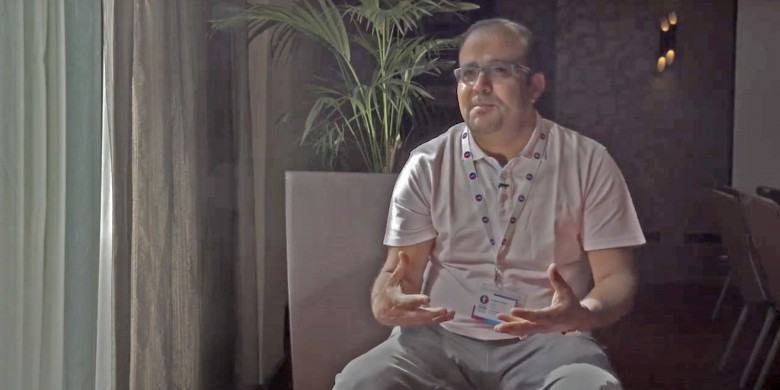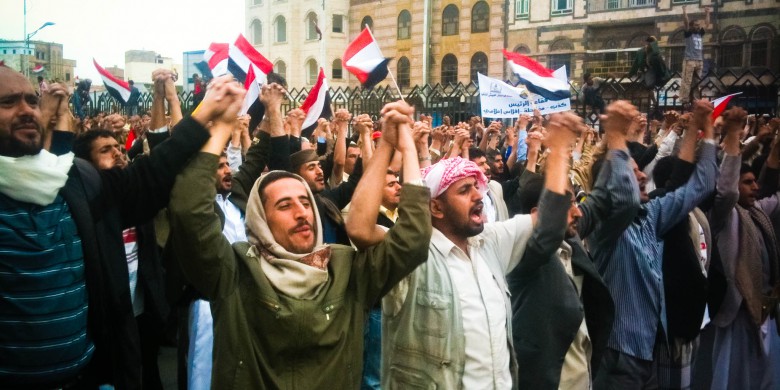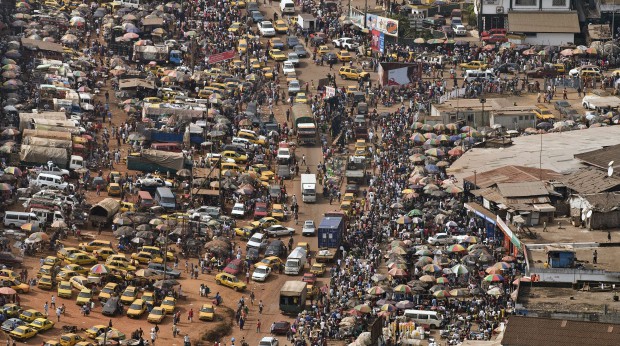
Faire face à deux fronts : COVID-19 pendant la guerre civile au Yémen
En période de crise, il est facile de perdre la vue d'ensemble. Une pandémie mondiale, comme celle à laquelle nous faisons face aujourd'hui, est un bon exemple de la manière dont notre réponse instinctive ne consiste qu’à se concentrer uniquement sur les aspects les plus clairement touchés : le système de santé d'une nation et son économie. Néanmoins, le COVID-19 peut sérieusement affecter d'autres domaines cruciaux de la vie, en particulier les questions de paix et de conflit.
Ceci est le troisième article dans une série qui se concentre sur le rôle de la société civile dans le soutien des actions locales réagissant au COVID-19. Par le biais d'entretiens avec des intervenants de première ligne, nous discutons des effets à court et à long terme du COVID-19 sur les perspectives de paix et de stabilité dans leurs pays.
« Notre monde est confronté à un ennemi commun : le COVID-19. Le virus ne se soucie pas de la nationalité ou de l'ethnicité, de la faction ou de la foi. Il s'attaque à tous, sans relâche. ... N'oublions pas que dans les pays ravagés par la guerre, les systèmes de santé se sont effondrés. Les professionnels de la santé, déjà peu nombreux, ont souvent été pris pour cible. Les réfugiés et autres personnes déplacées par des conflits violents sont doublement vulnérables. La fureur du virus illustre la folie de la guerre ».
(Appel du Secrétaire général des Nations unies en faveur d'un cessez-le-feu mondial, le 23 mars 2020)

Une fois que l'ampleur de la pandémie actuelle fut devenu claire, le fait que les personnes en situation de conflit permanent seront les plus gravement touchées le fut également. Suite à l'appel du Secrétaire général des Nations unies, António Guterres, la coalition soutenue par l'Arabie saoudite déclara le 8 avril une trêve unilatérale de deux semaines afin de tenter de contenir l'impact dévastateur de COVID-19 dans un Yémen déjà déchiré par la guerre. Cependant, cette trêve n'a pas été respectée. Au lieu de cela, le conflit s'est intensifié au cours des dernières semaines, entraînant de multiples morts en plus du nombre de morts déjà élevé. Et bien que la coalition saoudienne ait annoncé le 24 avril une prolongation d'un mois de son cessez-le-feu unilatéral, le scepticisme quant au réel respect à cette déclaration n’est pas nécessairement mal fondé.
La guerre civile yéménite ravage le pays depuis mars 2015, après que les forces d'opposition houthi aient envahi la capitale Sanaa en 2014, ce qui a suscité une réaction internationale, menée par l'Arabie saoudite en soutien à l'actuel président yéménite Abdrabbuh Mansur Hadi. La réaction saoudienne à la situation yéménite est odieuse : civils, jeunes enfants, personne n'a été épargné dans cette lutte pour le pouvoir. Un brouillon du rapport de l'ONU de 2017 sur les enfants et le conflit armé condamna la coalition saoudienne, déclarant : « Au Yémen, les actions de la coalition ont objectivement conduit à l'inscription sur la liste des meurtres et mutilations d'enfants, 683 enfants étant attribués à ce parti, et, étant responsable de 38 incidents vérifiés, d'attaques sur des écoles et des hôpitaux en 2016. »
La lutte pour le contrôle de la nation a laissé environ 80 % de la population dépendante à l'aide humanitaire et a fait plus de 100 000 victimes en raison de la violence, dont 12 000 sont des civils. En outre, plus de 85 000 personnes seraient mortes de famine, conséquence directe de la guerre. Pendant ce temps, le pays souffre de la pire épidémie de choléra de l'histoire moderne, ce qui fait de la situation yéménite la pire crise humanitaire du monde. La menace d'une pandémie dans cette situation déjà désastreuse ne fait qu'intensifier la nécessité d'une paix durable.
Pour le troisième article de cette série, le Secrétariat de la Plateforme de la société civile pour la consolidation de la paix et la construction de l'État (CSPPS) a discuté de la réalité du cessez-le-feu au Yémen en vue du COVID-19 avec Maged Sultan, membre de la CSPPS et président de l'organisation Youth Without Borders Organization for Development (YWBOD, Organisation de la jeunesse sans frontières pour le développement) au Yémen.
« Malgré la propagation de la pandémie dans le monde entier, les parties belligérantes au Yémen ne se soucient pas de travailler ensemble pour faire face à cette crise. Au lieu de cela, la violence et le conflit armé se poursuivent, et chaque partie essaie de remporter davantage de victoire politique et militaire sur l'autre. »
Malgré le cessez-le-feu déclaré par la coalition dirigée par l'Arabie saoudite et les Émirats arabes unis et, qui a promis d'arrêter les attaques aériennes pendant deux semaines, les opposants houthis sont venus avec des conditions déraisonnables de leur part et ont qualifié le cessez-le-feu déclaré un « manoeuvre », explique Sultan. Depuis, les deux partis ont poursuivi leur lutte pour le pouvoir.
Depuis l'échec de l'appel à un cessez-le-feu national, Sultan déclare que « les Houthis ont intensifié la violence contre les forces du gouvernement internationalement reconnu à Ma'rib, au nord du Yémen, et ils pourraient y gagner des zones géographiques et des camps militaires supplémentaires. La violence se poursuit également à Al-Jawf, et les forces gouvernementales internationalement reconnues continuent d'essayer de restaurer certaines des zones perdues par les Houthis. Il y a deux jours à peine, ils ont réussi à récupérer un des camps militaires qui s'y trouvaient. »
« Les Houthis ont intensifié la violence contre les forces du gouvernement internationalement reconnu à Ma'rib, au nord du Yémen, et ils pourraient y gagner des zones géographiques et des camps militaires supplémentaires. La violence se poursuit également à Al-Jawf, et les forces gouvernementales internationalement reconnues continuent d'essayer de restaurer certaines des zones perdues par les Houthis. Il y a deux jours à peine, ils ont réussi à récupérer un des camps militaires qui s'y trouvaient. »
Les Houthis imposent une interdiction de voyager à Taiz, et le conflit a monté en flèche depuis le début de la pandémie. De même, le Conseil de transition du sud (CTS), qui tente de séparer le sud du Yémen du reste de la nation, a continué d'exercer son pouvoir sur Aden, sans se laisser décourager par l'accord de Riyad conclu en novembre dernier.
En publiant des décrets de couvre-feu et d'autres mesures, censés contenir la propagation du COVID-19, le CTS eu trouvé des moyens supplémentaires d'affirmer son contrôle sur la région. Le 26 avril, cette situation dégénéra avec une déclaration d'autonomie, qui bouleversa l'accord de Riyad et, avec lui, toute perspective de paix imminente. Le contrôle indépendant sur les gouvernorats du Sud ne fait que compromettre davantage la possibilité d'un cessez-le-feu maintenu à l'échelle nationale au Yémen, amenant l'état de la nation à un point d'ébullition tant politique que militaire au milieu de la crise du COVID-19.
« Je tiens à le répéter : les parties belligérantes au Yémen n'ont pas réagi positivement à la propagation mondiale du virus. Au lieu de cela, ils prennent cette affaire comme un moyen d'obtenir plus de contrôle politique ou militaire. »
Le 10 avril, le premier cas de COVID-19 au Yémen fut confirmé à Hadhramaut, provoquant la panique au sein de sa population incroyablement fragile. Pour illustrer l'ampleur de cette peur, Sultan nous parla des nombreux messages sur les médias sociaux qui ont circulé après l'annonce du cas, appelant à la mort du patient afin d'épargner le reste de la population. Dans une société où la majorité de la population possède des armes, une telle peur peut facilement s'intensifier ou entraîner une propagation beaucoup plus rapide du virus lorsque les cas suspects sont cachés par crainte des répercussions. La désinformation et la peur au sein d'une population fragile, comme nous l'avons vu dans notre deuxième article sur le contexte libérien, aggraveront indéniablement tout statu quo. Dans ce contexte, au milieu de la pire crise humanitaire au monde, une pandémie mondiale pourrait très bien être le coup de grâce pour ce qui reste de la nation yéménite.
« La majorité de la population (plus de 70 %) dépend des revenus quotidiens, mis à part les pourcentages exorbitants de pauvreté et de chômage dans tout le pays. Un couvre-feu supprimera ces revenus quotidiens, et aucune alternative n'est proposée, ni par le gouvernement, ni par des autres acteurs. Que feront ces personnes ? Les vols et autres crimes sont les conséquences attendues, ce qui constitue une réelle menace pour la cohésion nationale et la paix communautaire. »
Sultan rappelle une réunion qu'il eut avec les forces de sécurité deux jours avant notre conversation, au cours de laquelle il demanda quelles étaient les procédures mises en place pour préparer les équipes de sécurité d'urgence au cas où le virus se propagerait dans la ville. « Rien », ont-ils répondu, « il y a des équipes de sécurité en place, mais elles ne sont pas préparées à travailler efficacement dans le cadre de la situation COVID-19. Il est très probable que les policiers s'enfuiront par peur d'être infectés, plutôt que de faire respecter la paix. »
En ce qui concerne la violence sexiste en particulier, Sultan prévoit une recrudescence une fois qu'un couvre-feu national aura été imposé. « Une fois que les hommes et les femmes seront confinés à la maison, il y aura une augmentation de la violence domestique. C'est exactement ce qui s'est passé en 2015, au début de la guerre : parce que les gens étaient forcés de rester à la maison, la terrible situation économique et le manque de sensibilisation à l'égalité des sexes, beaucoup de violences sexistes ont eu lieu. D'un autre côté, si les mesures de sécurité échouent par crainte des forces de sécurité, nous pouvons nous attendre à voir une escalade des cas de viols et de harcèlement sexuel dans les rues également. »
Vue que les institutions de sécurité ne fonctionnent pas correctement pour le moment, surtout avec la pandémie, l'insécurité locale et le conflit sont en augmentation. Sultan, en tant que président de l'organisation Youth Without Borders Organization for Development et membre de la CSPPS, a donc lancé un projet de consolidation de la paix, en collaboration avec la police et les communautés locales. À Taiz, ils installent des caméras de sécurité dans certaines zones à haut risque qui sont directement connectées à un serveur basé dans le commissariat de police, afin de renforcer le sentiment de sécurité qui subsiste. En outre, ils distribuent des masques et du désinfectant pour les mains et ont lancé des campagnes de sensibilisation du public, comme l'ont fait d'autres organisations de la société civile au Yémen, afin d'attirer l'attention sur la distanciation sociale et les autres précautions à prendre pour éviter l'infection.
Afin de soutenir le système de santé défaillant (seule la moitié des établissements de santé du Yémen sont encore pleinement fonctionnels, et il n'y a que 500 ventilateurs disponibles dans l'ensemble du pays), la YWBOD fournit les besoins logistiques et médicaux tels que des réservoirs d'oxygène et du désinfectant pour les mains à deux unités d'urgence, mais cet effort ne suffit pas car les défis s'accumulent dans tout le pays. Comme l'a déclaré le secrétaire général des Nations Unies, M. Guterres, dans son dernier appel le 23 avril: « La pandémie COVID-19 est une urgence de santé publique - mais elle est bien plus que cela. Il s'agit d'une crise économique. Une crise sociale. Et une crise humaine qui devient rapidement une crise des droits de l'homme. »

« Les gens – et leurs droits – doivent être au centre de l'attention. … Nous avons vu que le virus ne fait pas de discrimination, mais que ses effets le font – en mettant en évidence de profondes faiblesses dans la prestation des services publics et les inégalités structurelles qui en entravent l'accès. Nous devons veiller à ce qu'ils soient correctement pris en compte dans la réponse. » (Secrétaire général des Nations unies, le 23 avril 2020)
À la question de savoir si l'appel de M. Guterres à un cessez-le-feu global a été fructueux jusqu'à présent, Sultan répond : « Alors que le monde est occupé par le coronavirus, les parties en conflit au Yémen abusent de la situation en leur faveur, plutôt que de prendre des actions et des mesures susceptibles d'apporter des solutions au virus. » Sultan demande instamment que l'accord de Riyad soit appliqué et que la communauté internationale exerce une pression supplémentaire sur toutes les parties en conflit, qu'elles soient locales ou internationales.
« En particulier dans le cadre du COVID-19, un cessez-le-feu national pour résoudre cette immense crise humanitaire devrait être la priorité de toutes les parties concernées. Cela nécessite toutefois des voix de l'intérieur du pays, ainsi qu'une réelle pression au niveau mondial. Pour ce faire, nous devons répondre aux besoins urgents d'un cessez-le-feu, de ressources mobiles ainsi que d'efforts conjoints pour lutter contre COVID-19 dans une perspective globale. »
La communauté internationale a l'obligation de protéger et de respecter les droits de l'homme, notamment les droits des plus vulnérables. Plus de 6,7 millions de yéménites, un chiffre sans précédent, avaient déjà besoin d'aide avant l'apparition du COVID-19. La pandémie ne peut qu'aggraver leur situation.
Dans son récent exposé au Conseil de sécurité des Nations unies, l'envoyé spécial des Nations unies pour le Yémen, Martin Griffiths, a brossé un tableau de la situation actuelle, en déclarant que « le Yémen ne peut pas faire face à deux fronts en même temps : une guerre et une pandémie. Et la nouvelle bataille à laquelle le Yémen doit faire face pour lutter contre le virus sera dévorante. Nous ne pouvons rien faire de moins que d'arrêter cette guerre et de porter toute notre attention sur cette nouvelle menace. »
Face à deux fronts, Sultan demande à la communauté internationale, y compris au Dialogue international pour la consolidation de la paix et la construction de l'état, dont la CSPPS fait partie, de soutenir l'appel à un véritable cessez-le-feu. Le Yémen a besoin d'un cessez-le-feu national, qui doit être respecté et soutenu par toutes les parties prenantes. En tant que CSPPS, nous soutenons Sultan dans son plaidoyer et faisons appel à une communauté mondiale dans laquelle les membres se tiennent mutuellement responsables de leurs actions et des conséquences dévastatrices qui en découlent. L'urgence est indéniable. Au milieu de cette pandémie mondiale, surtout lorsqu'elle menace ceux qui ont déjà tant perdu, il n'y a tout simplement plus de temps à perdre. Il est temps d'agir pour la paix.
Article par Charlotte de Harder - CSPPS

